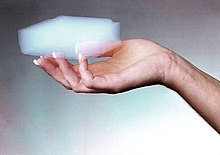Sample Collection for Investigation of Mars



The Sample Collection for Investigation of Mars (SCIM) is a mission concept for a Mars air and dust sample return. It was a semi-finalist at the Mars Scout Program along with four other missions in December 2002.[2][3] The SCIM mission would be designed to skim through the Mars atmosphere without landing or entering orbit.[1] It would collect samples in an aerogel and take them back to Earth on a free-return trajectory.[4]
The success of fellow Discovery program mission Stardust was noted as supporting future sample return missions, and in particular supporting the SCIM concept.[1] This Stardust mission was similar in that it returned extraterrestrial material to Earth with an unmanned robotic spacecraft.[1]
Overview
[edit]SCIM would collect air and dust samples by flying through the atmosphere of Mars without landing or orbiting.[5][6] The design utilizes heritage from the successful Stardust and Genesis sample return missions.[6] A pass through the atmosphere about 40 km (25 mi) above Mars' surface at a speed of 6 km/s would result in millions of particles being encountered.[7] The particles would be collected in an aerogel and returned to Earth inside a small sealed capsule.[7] Analysis of the dust could confirm the origin of the suspected meteorites on Earth from Mars.[7]
SCIM was studied in 2002 for the 2007 Mars Scout Program mission as a relatively low-cost, low-risk Mars sample return.[2][5] It achieved semifinalist status.[4][8] The other semifinalist missions were ARES, Phoenix, and MARVEL (Mars Volcanic Emission and Life Scout).[2] ARES was a powered Mars aircraft, Phoenix was a polar lander, and MARVEL was an orbiter.[9]
Private funding proposal
[edit]In 2014 the BoldlyGo organization stated their intention of raising money for this mission privately.[10] They stated that many space missions are not being flown due lack of funds, not because there are issues with the proposals.[10]
See also
[edit]References
[edit]- ^ a b c d Capsules From the Cosmos: Stardust Success Could Signal More Sample Missions by Leonard David, January 2006
- ^ a b c NASA SELECTS FOUR MARS SCOUT MISSION CONCEPTS FOR STUDY. Donald Savage. NASA. December 6, 2002.
- ^ NASA Selects ASU-Directed SCIM Proposal as One of Four Finalists for Mars Scout Mission Archived 2016-03-05 at the Wayback Machine. December 6, 2002.
- ^ a b /www.nasa.gov/home/hqnews/2002/02-238.txt[dead link]
- ^ a b Jones, S.M.; et al. (2008). "Ground Truth From Mars (2008) – Mars Sample Return at 6 Kilometers per Second: Practical, Low Cost, Low Risk, and Ready" (PDF). USRA. Retrieved September 30, 2012.
- ^ a b Wadhwa, et al. – SCIM (2012)
- ^ a b c Leshin, et al. – Sample Collection for Investigation of Mars
- ^ Scout Missions NewsWire: Recent Articles
- ^ NASA – NASA SELECTS FOUR MARS SCOUT MISSION CONCEPTS FOR STUDY Dec. 6, 2002
- ^ a b Nonprofit Organization Seeks To Raise a Billion Dollars To Fund Space Science Missions



